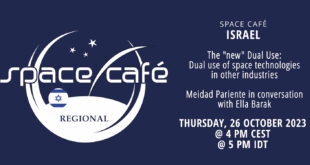By Meidad Pariente

In the eleventh episode of Space Café Israel, Meidad Pariente is in conversation with Lior Herman, Co-Founder & Managing Partner at TYPE5 Aerospace VC.
Can you share something personal that isn’t written in your LinkedIn profile?
The first thing that comes to my mind is that I’m a sci-fi geek, so I’m a fan of Star Trek and all science fiction novels. So that’s a lot of, you know, my ideas and creativity is around looking at science, looking at technology, and looking how they can work together in the future to create new solutions and many, many new opportunities and life events. So that’s part of me that is not on my LinkedIn profile for sure.
What is Type5, What is it all about, and how are you different from other VCs in the industry?
So Type5 VC, first of all, it’s a management company that both raises funds and also helps companies within the space ecosystem and deep tech to achieve better results, to have better strategic positioning and marketing, and of course, exit eventually. We are relatively new. It’s been less than two years since we launched Type5. And today, we are an umbrella that includes both the fund working with startups and entrepreneurs and also leading the conversation in Israel now with the space Tech Summit, which is a little bit more focused on technologies and startups than what we believed, before we came into the picture, in Israel at least. So that’s a little bit about us. We are a team that comes from multiple backgrounds. As you mentioned, I’m a product manager in my profession, I come from the high tech sector, and other team members coming from, you know, the banking industry, family offices, aerospace executives, strategy consultants, and a lot of multiple talents in one group, we think that it’s important, just like space is about collaboration. So when you want to create, you know, a business that is involving space, you got to have a lot of accumulative talent. So that is what Type5 is all about. We are much more broader than what we were about two years ago, as we understood that our place in the industry is not just, you know, to deliver smart Capital, but it’s also to create value. And to be like a venture studio firm that helps companies toucceed eventually.
Entrepreneurs that want to build a space in startups, they cannot focus only on space, they might must create a real business model that utilize and catalysts from space. That would be that would be the challenge to start with.
I want to pick your brain regarding something I discussed with one of the CEOs of an Israeli space startup. He said that Since in the space industry, the ROI is between five to 10 years, it’s much more suitable to break investments stages like pre-seed, seed, pre-A, A, pre-B, B, etc.. and have achievable goals and achievable milestones, which is a bit different in the space industry. What do you think?
I think that it’s true. I would say it’s almost even not realistic otherwise when you’re talking about space startups because it’s like talking about an internet company that cannot connect to the internet in a way. So, reaching space is one thing, and developing a business per space is a whole different thing. I believe that to have a good business model in space, you first have feet on Earth, actually, and prove that your technology can be deployed for and well-established industry while you’re building. your NASA and DoD contracts. Prove that you have the type of business model that will enable you in space, as well. So it’s a big challenge. And we see how companies today, even Israeli startups that reach space already, like StemRad, for example, as I’m sure you know, a lot of their business coming from medical centers and nuclear facilities. So my answer is that entrepreneurs that want to build a space startup, cannot focus only on space. They must create a real business model that utilizes catalysts from space. That would be the challenge to start with. And you can see it happening. You know, in Silicon Valley, if you take, for example, Varda Space Industries, which has been talked about a lot recently because of Peter Thiel‘s investment, I think what’s interesting thereת is not only the fact that probably the most experienced investor in the Silicon Valley, puts his weight on this company, but their business model is quite unique, they are actually building on royalties from the pharmaceutical companies, and not just about the platform that they provide for the for the experiments in space. So meaning they are creating their value proposition on Earth. And then they are scaling and experimenting and working in space. So that’s the biggest challenge.
Shoutout time: which Israeli space startups and companies should we follow?
Yeah. Absolutely. As I said, GorillaLink is a company I can mention, and another company that I think is essential, and it’s again, interesting not because of what we’re doing today, but it’s because of its future capability. It’s RedC Biotech, developing red blood cells, which is another critical life or death solution for remote treatment in space, but obviously, in the blood donation market. What’s interesting for me is that as a product analyst, or product manager, their technology is not only relevant to create synthetic blood cells, you can create using stem cells in space, much more critical. Body nutrition is components and supplements that cannot be provided otherwise. So RedC is a very interesting company for space. And also, as I said, in Earth applications.
What do you think the Israeli space industry will look like in 2050?
That’s a very good question. I can tell you that I hope that Israel will have a Spaceport in 2050. And I hope that Israel will be one of the dominant countries in developing space components for space transportation, and also for space communication. I think that Israel’s capabilities in communication, cybersecurity, and quantum communication area are amazing. So I’m hoping that in 50 years, Israel will be one of those leading countries that are able to duplicate the successes of the cyber industry into space communication, and also to space transportation with a nice spaceport near Tel Aviv or Haifa. That will be a great success story for us. And obviously hoping to have much better rockets than we have today. I believe we’re only at the beginning of the launching capabilities
Lior Herman is Co-Founder & Managing Partner at TYPE5 Aerospace VC, an IT Product engineer who worked with leading enterprises like Microsoft, Facebook, Varonis, IAI, and IDF. Lior is a full-time entrepreneur and futurist, an expert in product research and deep tech analysis, technology solutions architecture, and leading experience design for startup companies from early vision to production and scale.
 SpaceWatch.Global An independent perspective on space
SpaceWatch.Global An independent perspective on space




